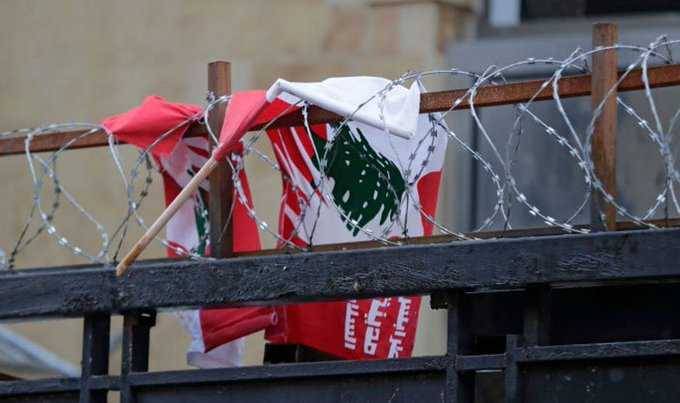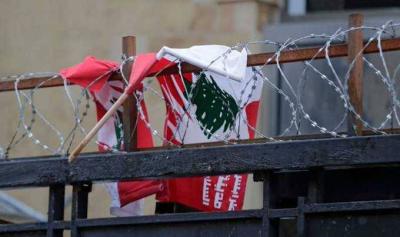The threatening attack launched by Hezbollah Secretary-General Hassan Nasrallah in his recent speech against Cyprus dealt a severe blow, not only to the well-established Lebanese relations with one of Lebanon's closest neighboring countries but also to the "non-state" of Lebanon, which appeared to be in a state of considerable exposure, embarrassment, and confusion to the extent that it became impossible to issue a formal statement of condemnation or disavowal from any official Lebanese representative, as reported by "An-Nahar."
The official response was absent for hours as Nasrallah's threat to treat Cyprus as part of the war if it opened its airports to Israel, as he warned, was unfolding. The announcement was eventually made that Lebanese Foreign Minister Abdullah Bou Habib contacted his Cypriot counterpart Constantinos Kombos, with reports indicating that caretaker Prime Minister Najib Mikati had a morning call with the Cypriot president and agreed to address the matter calmly and without media noise, downplaying the issue.
However, the lack of a public official response clearly outlined the renewed exposure of the Lebanese government, state, and diplomacy, as the implications of the threat began to touch on responses that have not yet fully formed but signal diplomatic repercussions first and security consequences second. It is noteworthy that this issue will not be limited to Cyprus but will extend to the entire European Union, especially since the Cypriot response to Nasrallah's threats was clear, with the Cypriot government denying that any country would be granted permission to conduct military operations through Cyprus.
What was particularly striking about the negative reverberations of this development was that the "non-state" not only failed to address a serious shock that threatens Lebanon's close relationships with a country of such crucial geographic and strategic importance to Lebanon, but it also vanished in addressing the severe aspects discussed by Nasrallah regarding war and preparations for it, as if there were no state in Lebanon concerned with his statements.
The government's response to Nasrallah's threat was limited to formal attempts at containment; Minister Bou Habib made contact with the Cypriot Foreign Minister and expressed Lebanon's continued reliance on the positive role that Cyprus plays in supporting stability in the region. The Cypriot minister confirmed the essence of the statement issued by the President of Cyprus two days earlier, noting that his country hopes to be part of the solution, not part of the problem, and emphasized that Cyprus is not willing to engage in any form in the ongoing war in the region. It was clarified that the decision to close the Cypriot embassy for one day was pre-scheduled for administrative reasons related to visa procedures and would resume operations as usual starting today.
After reports interpreted the closure of the Cypriot embassy in Lebanon as a reaction to Nasrallah's remarks, the embassy announced in a statement that the consulate would not accept any visa or authentication requests for one day only, on June 20, 2024. The Foreign Ministry issued a statement reiterating that Lebanese-Cypriot relations are founded on a rich history of diplomatic cooperation and that there is ongoing communication and discussions at the highest levels between the two countries concerning matters of mutual interest.
However, media reports indicated that Britain, the U.S., and Israel, in cooperation with Cyprus, are conducting a comprehensive survey of Lebanese individuals on the island, with plans to treat those connected with Hezbollah in Cyprus as terrorists. There are also reports of Hezbollah's intention to target British, American, and Israeli interests in Cyprus since two months ago.
### Internal Reactions
Nasrallah's attack on Cyprus drew negative internal responses, most notably from former head of the Progressive Socialist Party Walid Jumblatt, who wrote on X: "In the days of the Cold War, both sides reached a mutual understanding of mutual assured destruction, meaning that no side could win without the end of humanity. Note: Cyprus has been a refuge for Lebanon for decades during times of crisis."
In turn, MP Ghassan Hasbani from the Strong Republic bloc emphasized that Nasrallah's threat to Cyprus is not only embarrassing but very dangerous, as this "party" had previously threatened sister Gulf countries and isolated Lebanon, and now it is expanding this threat through Cyprus to encompass the European Union, of which it is a member. This poses a danger to Lebanon as a country and isolates it from the world.
A group of opposing political activists issued statement number 1, with plans for further statements in the coming days, asserting that Hezbollah's actions harm Lebanon's and the Lebanese people's interests, disregarding the constitution when threatening a sister state considered by the world as the eastern gateway to Europe and the only window to the West. They emphasized that there exists a Lebanese option that rejects Hezbollah's behavior in form and content. To protect Lebanon's interests and relations, they called on the government and the parliamentary council, both presidency and general assembly, to step out of resignation from their roles and take swift and effective action in rejection of what Nasrallah said and in defense of the interests of millions of Lebanese.
### British Mediation
Regarding the explosive situation in the south, Mikati's media office announced last night that he received a call from British Foreign Secretary David Cameron, expressing Britain's readiness to make any calls and efforts to reduce tensions in southern Lebanon and to stabilize calm, security, and stability.
CNN reported that Israel informed Washington of its readiness for a ground incursion and airstrike on Lebanon, quoting a senior American official as saying that the likelihood of war between Israel and Hezbollah is increasing as the chances of reaching an agreement between Israel and Hamas are diminishing.
During her first visit to the headquarters of the United Nations Interim Force in Lebanon (UNIFIL) in Naqoura, the United Nations Special Coordinator for Lebanon Jeanine Hennis-Plasschaert met with the head of the UNIFIL mission and its commander, General Aroldo Latharo, and the UNIFIL peacekeeping forces deployed in southern Lebanon. She stated that our joint efforts aim to restore stability along the Blue Line after more than eight months of intense exchanges that have disrupted the lives of tens of thousands on both sides. It is essential for all parties to cease fire exchanges and commit to sustainable solutions in line with Security Council Resolution 1701. She commended UNIFIL's leadership and the dedication of its peacekeepers, who are always on the ground and continue their patrols in the area south of the Litani River despite the difficult and dangerous circumstances, according to "An-Nahar."




